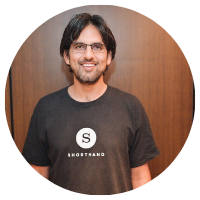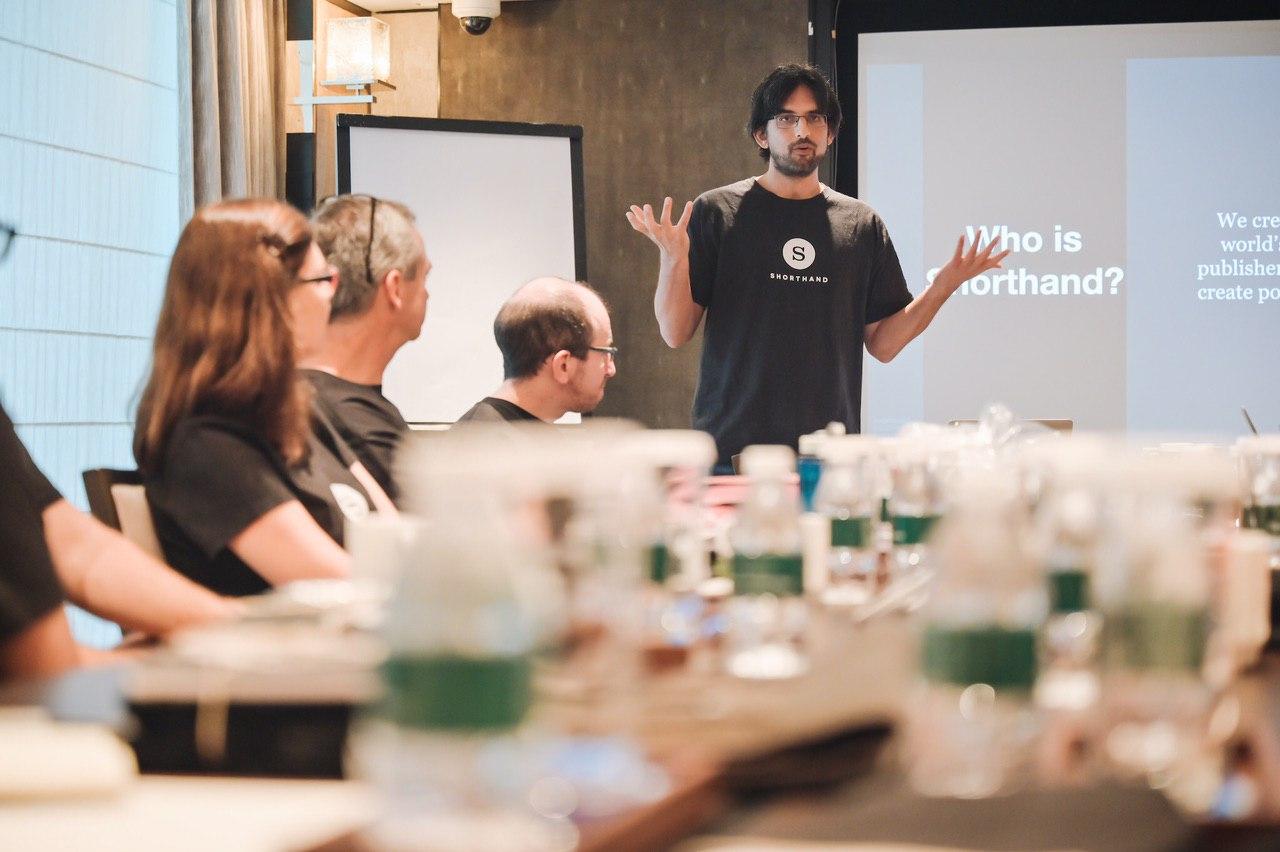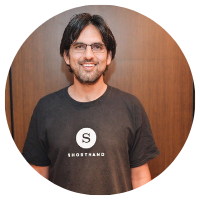Ricky Robinson, CEO of Shorthand, explains why mental toughness is important to running and running a company.
What is the story behind Shorthand?
The brief version of Shorthand’s story goes something like this: backed by Australian entrepreneur and philanthropist, Graeme Wood, the initial Shorthand team was spun out of one of Graeme’s independent news media projects, The Global Mail. This was in early 2013. The idea was to build data journalism tools to enable data journalists to quickly create the kinds of engaging data stories The Global Mail was famous for. But the team soon pivoted to building a tool for rich, long-form storytelling of the kind made famous by The New York Times’ Snow Fall project. We started selling the product to some big-name publishers like the BBC, The Guardian, and The Telegraph, and our business took off from there.
Of course, the real story behind any company is never quite that simple, and that’s definitely true in Shorthand’s case! I’ll leave the whole story for another time. But one element of our story that is simple is our brand, which has stood the test of time and gets stronger with every passing day.
When did you start thinking about your brand name and how did you settle on Shorthand?
At the beginning, our tool was used only for creating long-form, scrolling stories. So our tool was the quick, or “shorthand”, way to create long reads. Thus, Shorthand.
How did you get the domain name shorthand.com for your brand? Why did you select that one exactly?
The details of how we came to be in possession of Shorthand.com have been somewhat lost in the mists of time. But as the story goes, one of our team members was able to purchase the domain from a domain squatter at a discounted price by claiming that he’d have to get permission from his mum to go through with the purchase. Cheeky, but it worked, and the domain name is being put to much more valuable use.
How has owning Shorthand.com affected your business? Do you own any other domain names?
It’s always helpful to own the domain that matches your company name exactly. So we’re lucky in that regard. We own a few other domain names, the primary one being ShorthandStories.com, which is where our customers’ stories are published if they don’t have their own hosting infrastructure or domain.

It’s always helpful to own the domain that matches your company name exactly. So we’re lucky in that regard.
Ricky Robinson, CEO of Shorthand
Who is your target customer and how is your brand name helping in reaching them?
Our target customers are typically iconic brands and news publishers. Those “brands” can be anything from university marketing communications teams like The University of Cambridge, nonprofits like Save The Children, and, of course, the likes of Honda, Manchester City FC, and The Sydney Opera House.
What all of these customers have in common is that they know that on the web today special is the new normal. In other words, to captivate an audience you need to have great stories to tell, and you have to tell them in an engaging way. Immersive reads are responsible for a growing proportion of engagement on the web, but the problem is that they have historically been expensive, time-consuming and frustrating to create.
That’s where Shorthand comes in, and that brand name goes right to the heart of the value that we provide: create immersive reads quickly, cost-effectively, and without the frustrations of the back and forth with web designers and developers.
How do you keep your brand consistent across different channels online and offline?
The honest answer is that we still have a very small brand footprint relative to the outsized impact Shorthand stories have made in the world (according to Chartbeat’s wrap of the 100 most engaging articles on the web in 2019, 7% of those were created with Shorthand). This means that keeping our brand consistent hasn’t proved a major challenge yet. Everything public-facing passes through the same team of people, which makes it simple enough to speak with a consistent voice.

Has the pandemic affected your company in any way? What has changed since?
We’ve been fortunate that the demand for premium web content has only increased as a result of the pandemic. Exposure to Shorthand stories and our brand has grown alongside that demand.
April set a new record for views of Shorthand stories. During that month, audience sizes for COVID-19 stories peaked at extraordinary levels. Shorthand customers — such as the World Health Organisation and leading universities working on COVID research — published some of the most important stories on the unfolding global situation using our platform.
At the same time, we’ve had to adapt by keeping a close eye on what’s been happening in the varied industries we serve. Some of those industries have struggled more than others, and so we’ve responded to that. By staying in tune with customers’ and readers’ needs, and continuing to improve our product, we’ve managed to continue growing during this unprecedented period.
What do you do to make sure your marketing is effective?
We’re learning all the time, and we’re always trying to improve in this area. I think one thing we’ve always been pretty good at is listening. The challenging part is knowing how to take what we’re hearing and turn it into a better product and more targeted messaging. We’re doing a much, much better job of segmenting our customers, understanding where we’re making the biggest impact, and then adjusting what we do based on that.
For example, we recently made the hard decision to remove the lowest tiers of our pricing structure and push upmarket significantly. Though that decision was taken only a few months ago, it’s already had a major positive impact on our business.
What would your advice be to entrepreneurs who are just starting out, in general, and when it comes to branding and naming?
I used to really hate running unless I was on a football field with a ball at my feet. I tried several times over the years to make jogging a daily or at least weekly habit. But it never stuck for more than a couple of runs.
That changed at the end of 2019. Since then I’ve managed to make running a regular part of my routine. And I think the reason it’s different this time is that I realised the hard part wasn’t my lack of physical fitness (I mean, of course, I was unfit), it was mental toughness and persistence. Your lungs are heaving. Your calves are burning. Your heart is pounding. Your whole body is telling you to stop. That’s what being unfit means!
To get fit, you’ve got to push through that, and that’s all about mental toughness. And then when you’re fitter, it just means you can run faster and further, but it’s still just as tough. I never truly understood that.
If you’re just starting out on your entrepreneurial journey, realise that there’ll be lots of signals telling you to stop. It will be painful. But you have to find a way to keep going despite it all. And when you’ve got your business really cranking, it’s still going to be tough, just in different ways.

If you’re just starting out on your entrepreneurial journey, realise that there’ll be lots of signals telling you to stop. It will be painful. But you have to find a way to keep going despite it all.
Ricky Robinson, CEO of Shorthand
In terms of branding specifically, I refer to the great Steve Jobs: marketing (and branding) is about values. It really is. Know who you are and what you stand for as a company, and it will make a lot of decisions easier, including what your name and logo should be. It will also help you to figure out in broad terms who your ideal customers are.
Where do you see your business in the future and how does your brand name fit into that vision?
Shorthand has always been seen as the “premium” storytelling platform. We’ve been careful to nurture that perception. What we’ve realised recently is that we should be leveraging that premium brand and the iconic brands that already use and love Shorthand, to push much further upmarket. Shorthand is arguably already the defacto platform for quickly creating immersive reads when it comes to news and brand publishing, but now we’re seeing it used for internal communications, annual reports, and a range of other types of digital storytelling. Shorthand is becoming the “shorthand” way for creating any kind of immersive read for the web.
We hope this will be of use to you in the process of getting your perfect domain name. If you have any questions, need any help or just want to chat with someone about the process, book a free consultation using the form below. We are always happy to hear from you.
Find out more about Shorthand.


Previous Next